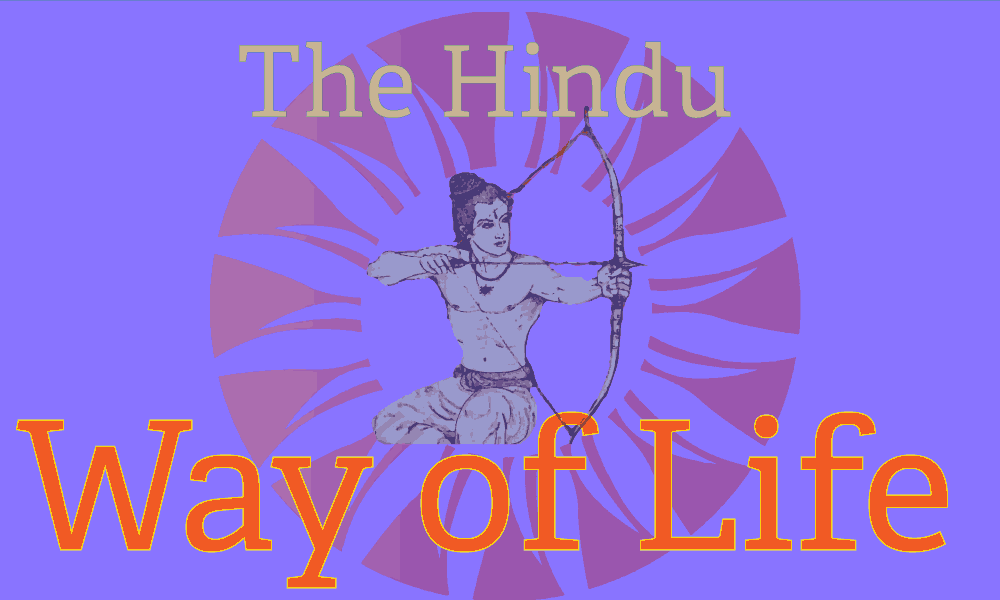Focus on Individual:
Unlike other religions, origins of Hinduism are not limited to any one event or one prophet or a group of prophets. It has evolved with time and continues to do so even today. That is why Hinduism is seen more as a way of life than a religion. In line with this philosophy Hinduism focuses first and foremost on the individual. It allows every individual to find his or her own path towards the ultimate aim of being one with the divine. Following one’s ‘dharma’, which leads to spiritual advancement, is considered as acting in the service of humanity and in turn that of God. Each individual has his or her own ‘dharma’ since what is right for one may not necessarily be right for the other.
Hinduism believes that when individuals become better human beings, the society does so automatically. If all individuals play their parts sincerely as per their ‘dharma’ and perform their sacred duties, the society, and in larger context the humanity, will prosper to make the world a better place to live.
Absence of Slavery:
Hinduism has never practiced or believed in the concept of slavery that some other religions have practiced for centuries. If Hindus went to foreign lands, it was primarily for trade and commerce in a fair and cooperative environment for mutual benefit. In the process, it was natural for parts of Indian culture to spread in the lands that they visited. A prime example of this is Indonesia where Indian culture and Hinduism continues to flourish in harmony with Islam, the religion of the majority in the country.
It is interesting to note that even the migrant Indian labour that was taken to far off places like Mauritius, Fiji and Caribbean Islands by the British, went on a contractual basis and not as slaves. In short slavery was something that never formed part of Hinduism or its culture. In wars, a Hindu victor always treated the loser with respect and dignity. Women were never herded off to victor’s harems or enslaved. They never followed the ‘scorched earth’ policy after a victory.
Aversion to Invasions/ Wars:
Unlike Christianity and Islam, Hindu rulers from India never invaded other nations. Buddhism, a religion that was born out of Hinduism, reached many parts of the world and became a dominant religion in many nations including China. Its spread was devoid of any bloodshed or invasions. The credit for its spread goes to the travellers who came to India from these lands and carried back the teachings of Lord Buddha. In this process, Hinduism also shared its huge knowledge bank of medicine, governance, art and culture. The peaceful nature of Hinduism can never be doubted and History stands witness to it. However, Hinduism is not against battles that are fought for victory of good over evil or truth over falsehoods or self-defence. Such battles are concerned as part of one’s dharma. While Ahimsa advocates non-violence, dharma allows use of force in righteous battles as part of one’s moral duty towards self and the society.
Peaceful Coexistence:
Hinduism believes that ultimately there is only one supreme God. As individuals we may chose different paths and teachings but finally all lead to the same truth. The choice of which God to worship or how to worship is left to the individual. The primary goal in life is to connect with the Supreme God through one’s inner consciousness. Hinduism sees the whole universe as one big family – Vasudhaiva Kutumbakam. From this stems the will to coexist with others. All this reflects the inherent tolerance of Hinduism for other religions and its willingness to coexist peacefully.
Freedom of Thought & Religion:
Hinduism has always stood for the right to religious freedom universally. Hinduism does not believe in conversions. It also advocates that those religions that believe in converting others as part of religious freedom, must also give the right to renounce one’s religion – something that no other religion speaks of. The maturity of Hinduism is reflected in the fact that it does not assert that the path to emancipation lies only through Hinduism. It can be achieved through other religions as well.
There is an absolute freedom in Hinduism on subjects like nature of God, forms of worship, rituals and the course to follow in life. If in some parts of India Lord Krishna is visualised as fair, in others his incarnation is jet-black. Yet he remains Lord Krishna for all. The prayers, rituals and offerings in front of the same deity differ in content and practice in different parts of the country. Yet that deity belongs equally to all Hindus.
Hinduism does not try to control the minds of its followers. It actually encourages them to reason through freedom of thought, feeling and individual beliefs. There is no one fixed doctrine, one document or one way of life that all have to accept. Hinduism encourages reflection, investigation and enquiry. It is to the credit of this great religion that despite all this variance and freedom, there still remains an overall uniformity in belief, outlook on life and the vision of the world. In Hinduism, religion and philosophy go hand in hand.
Respect for Nature:
Hinduism is unique in its quest to be in harmony with the nature. There are many writings on ecology from ancient times that support this claim. Hinduism believes that the earth is sacred and terms it as a Divine Mother. Mountains, rivers, trees, plants, fruits and flowers are all revered in various ways. Rivers are seen as a means for purification because of their eternal flow that cleanses continually. Rising or setting sun or the evolution of a full moon are all linked with special prayers. Many Hindu rituals work in consonance with forces of nature to harness higher energy for betterment of mankind and the world at large. If some sites linked with sages, Gods or Goddesses are sacred to Hindus, so are many natural locations that have no links with them.
Hinduism believes in divine nature of the universe and that humans, animals, plants along with everything else in nature, are but a part of it. The concept of non-violence (Ahimsa) also stems from this Hindu philosophy of not hurting any living being. Indian texts like the Mahabharata, Ramayana, Vedas, Upanishads, Bhagavad Gita, Puranas and Smriti, all contain messages for preservation of environment and maintaining an ecological balance. Animals like elephant, horse, cow, bull, boar, tiger, and lion are considered sacred and given an exalted status. In many cases they are worshipped along with many Hindu deities. This just goes to show the respect and connect that Hinduism encourages with nature.
Stature and Respect for Women:
No religion comes even close when it comes to respect and stature of women in Hinduism. It is unique in its recognition and worship of God in feminine form. Parvati, consort of the all-powerful Lord Shiva, is also known as Goddess Shakti – mother of the universe and is credited with incredible powers. Thus, a woman is never seen as the weaker gender in Hinduism as it believes in gender equality.
Mother, and by default woman, is revered in Hindu culture and religion. The three most important facets of human life – knowledge, power and wealth – are represented by Goddesses Saraswathi, Durga and Lakshmi. Any reference to Lord Shiva is incomplete without referring to Parvati in the same breath. In line with this thought it is always Sita -Ram and Radhe – Krishna. Any less than equal status of the female in the Hindu society is not because of Hinduism but because of some social practices that have failed to live up to the ideal of gender equality as preached in Hinduism.
With such singular inherent strengths of Hinduism that no other religion can ever boast of, why should there be any hesitancy in being proud of our religion. Is it because of centuries of subjugation under Mughals and the British that we have become accustomed to suppressing the greatness of our religion? Why do educated Hindus feel western ideas and ideals are superior to our own? Or is it that in independent India, we have been conditioned to believe that secularism is all about the majority doing its utmost to appease minorities to maintain peace and tranquillity at all costs?
There is no one reason why Hinduism finds itself in a quandary today. Many factors have contributed to its current state of perplexity and uncertainty. It is time for the nation to address this serious issue.
Some brief quick points to pride to be Hindu :-
- I’m hindu by birth and choice.
- Hinduism never taught to harm anyone.
- Hinduism never mocked other religions.
- Hinduism respects every religion and looks it as one more way of reaching god.
- Hinduism never created fear in the name of god.
- Hinduism gives endless freedom.
- Hinduism treats devotees, athiests, non Hindus and other religion followers as humans.
- Hinduism revolves around Karma. Whatever you do will return to you.
- Hinduism provided greatest epics like Vedas, Ramayan, Mahabharata and enlightened everyone.
- Hindu mythology is actually a history. There are many proofs for everything that was mentioned in our epics.
- Hinduism contributed to maths, medicine, astronomy, science in those days where others weren’t aware of civilization.
- Hinduism is the most scientific religion.
- Hinduism is not only a religion but a way of life.
- Hinduism is the most ancient religion. So, it is also known as Sanathan dharma.
- Hinduism never encouraged forced conversions.
- There’s no blasphemy, anything can be questioned in Hinduism.
- Hinduism with its gods and characters in epics taught most valuable lessons to build one’s character. They also described the ideal way of living a life to attain moksha.
- Hinduism gave perfect explanation of body and soul.
- Our ancestors were killed, forced, invaded, robbed, tortured, taxed by many but still remained Hindus.
- Hinduism preaches ahimsa.
- Hinduism treats every single creature in same way. Right from monkey to elephant, fire to water, everything is worshipped as we see god everywhere. Everything is his creation and he is omnipresent.
- Hinduism is probably the only religion which worships women as goddesses.
- Hinduism preaches ‘vasudaika kutumbam’ which means world is a family.






Can you be more specific about the content of your article? After reading it, I still have some doubts. Hope you can help me.
Your article helped me a lot, is there any more related content? Thanks!